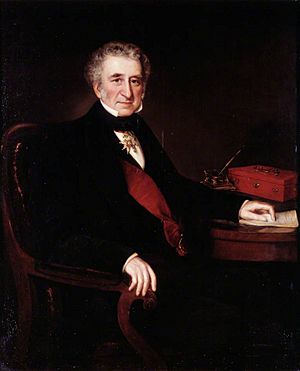John Fane, 11th Earl of Westmorland facts for kids
Quick facts for kids
The Earl of Westmorland
|
|
|---|---|

John Fane, 11th Earl of Westmorland, by Julia Goodman, c. 1855 (Royal Academy of Music)
|
|
| Member of the British Parliament for Lyme Regis |
|
| In office 1806–1816 Serving with Henry Fane
|
|
| Preceded by |
|
| Succeeded by |
|
| Envoy Extraordinary and Minister Plenipotentiary to Tuscany | |
| In office 1814–1830 |
|
| Preceded by | Hon. William Wyndham |
| Succeeded by | Sir George Seymour (as Resident) |
| Envoy Extraordinary and Minister Plenipotentiary to Prussia | |
| In office 1841–1851 |
|
| Preceded by | Lord George Russell |
| Succeeded by | The Lord Bloomfield |
| British Ambassador to the Austria Empire | |
| In office 1851–1855 |
|
| Preceded by | The Viscount Ponsonby |
| Succeeded by | Sir George Hamilton Seymour |
| Personal details | |
| Born | 2 February 1784 Piccadilly, London, England |
| Died | 16 October 1859 (aged 75) |
| Spouse | Priscilla Anne Pole-Wellesley |
| Children |
|
| Parents |
|
John Fane, 11th Earl of Westmorland (born February 3, 1784 – died October 16, 1859) was an important figure in British history. He was a soldier, a politician, a diplomat, and even a talented musician and composer. Before he became the Earl of Westmorland in 1841, he was known as Lord Burghersh.
Contents
Early Life and Education
John Fane was born in London. His father was the 10th Earl of Westmorland. His mother, Sarah Child, came from a very wealthy family. Her father, Sir Robert Child, built the famous Osterley Park. John had a sister, Sarah Villiers, Countess of Jersey, who was well-known for hosting social events. His uncle was William Lowther, 1st Earl of Lonsdale, a powerful politician.
John went to Cheam School and then to Harrow School from 1797 to 1799. Later, he studied at Trinity College, Cambridge, where he earned a Master of Arts degree in 1808.
A Career in the Military
John Fane began his military career in 1803. He quickly rose through the ranks. By 1805, he was a captain. He served as an aide to Sir George Don in Hanover.
In 1806, he became a Member of Parliament (MP) for Lyme Regis. Soon after, he was sent to Sicily and Egypt. He was part of Admiral Duckworth's fleet during the Dardanelles Operation. He also took part in the Alexandria expedition of 1807.
He joined the army in Portugal in 1808. This army was led by Sir Arthur Wellesley, who later became the Duke of Wellington. John fought in key battles like Roliça and Vimiero.
Fast Promotions and Challenges
In 1809, John was promoted very quickly to major and then lieutenant colonel. This rapid promotion caused some debate in Parliament. Some thought it broke army rules. Because of this, his promotions were cancelled. However, he was determined to serve. He wrote to his father, saying he truly loved the military.
He continued to serve in Portugal with the 3rd Dragoon Guards. He fought in the Peninsular War battles of Talavera and Busaco. He also became an extra aide-de-camp to the Duke of Wellington.
John Fane received several honors for his military service. He was made a Companion of the Order of the Bath (CB) in 1815. He continued to be promoted, becoming a major general in 1825 and a lieutenant general in 1838. He reached the rank of general in 1854.
Political and Diplomatic Roles
John Fane served as a Member of Parliament for Lyme Regis from 1806 to 1816.
He also had a long and important career as a diplomat. He represented Britain in several countries:
- He was the British Minister to Tuscany from 1814 to 1830.
- He served as the Envoy to Prussia from 1841 to 1851.
- He was the British Ambassador to the Austrian Empire from 1851 to 1855.
In 1855, he was one of Britain's representatives at the Vienna Congress.
Diplomatic Challenges
During the Revolutions of 1820, John Fane faced a challenge. The Austrian government accused him of supporting revolutionaries in Naples. His own government asked him to be more careful. He explained that while he didn't support the revolutionaries, he worried that Austria's harsh response would lead to more trouble.
He was honored for his service. He became a Knight Grand Cross of the Royal Guelphic Order (KCH) in 1817. He was also made a Knight Commander of the Order of the Bath (KCB) in 1838 and a Knight Grand Cross of the Order of the Bath (GCB) in 1846. In 1822, he joined the Privy Council.
A Passion for Music
Beyond his military and political life, John Fane was a very talented musician and composer. He loved music and spent much of his free time studying it. He was a good violinist and wrote many musical pieces. He also helped start the Royal Academy of Music, a famous music school in London.
Family Life
In 1811, Lord Westmorland married Priscilla Anne Pole-Wellesley. She was the daughter of William Wellesley-Pole. They had seven children together:
- Lady Rose Sophia Mary Fane
- Hon. John Arthur Fane
- George Augustus Frederick John Fane, Lord Burghersh
- Maria Louisa Priscilla Fane
- Ernest Fitzroy Neville Fane, Lord Burghersh
- Francis Fane, 12th Earl of Westmorland (who became the 12th Earl after his father)
- Hon. Julian Henry Charles Fane
John Fane passed away in October 1859 at the age of 75. His son, Francis, became the next Earl of Westmorland. His youngest son, Julian, also became a diplomat and was a poet. His wife, Priscilla, died in 1879.
See also
- Internationalization of the Danube River
 | Kyle Baker |
 | Joseph Yoakum |
 | Laura Wheeler Waring |
 | Henry Ossawa Tanner |

